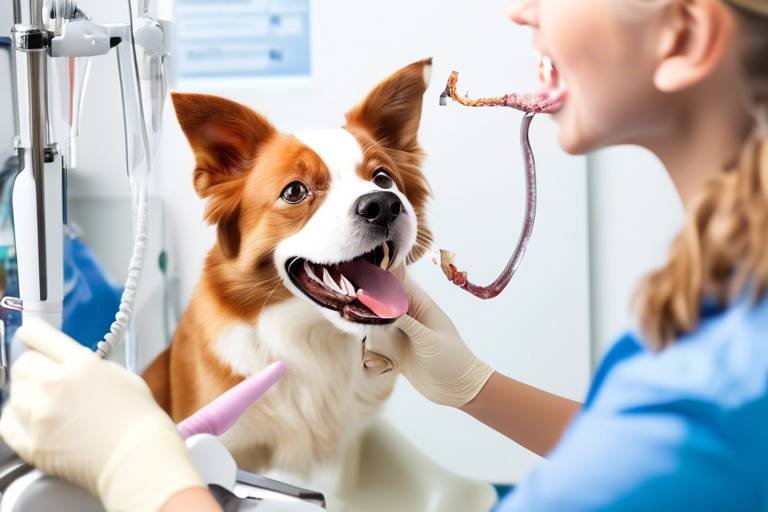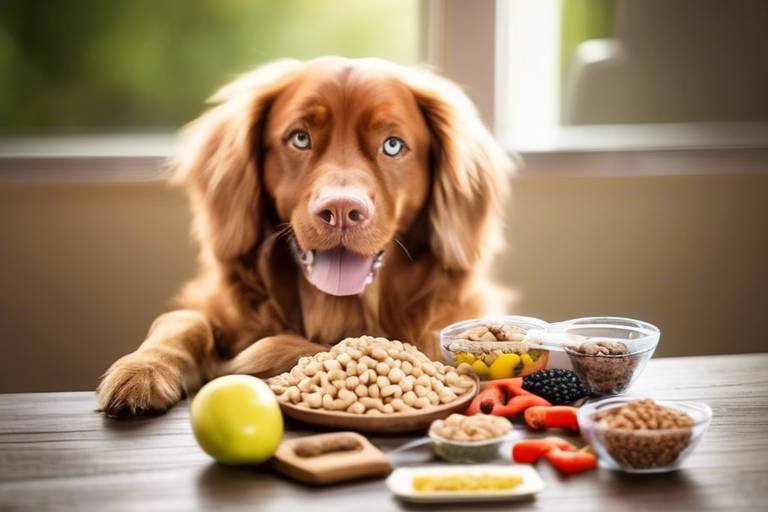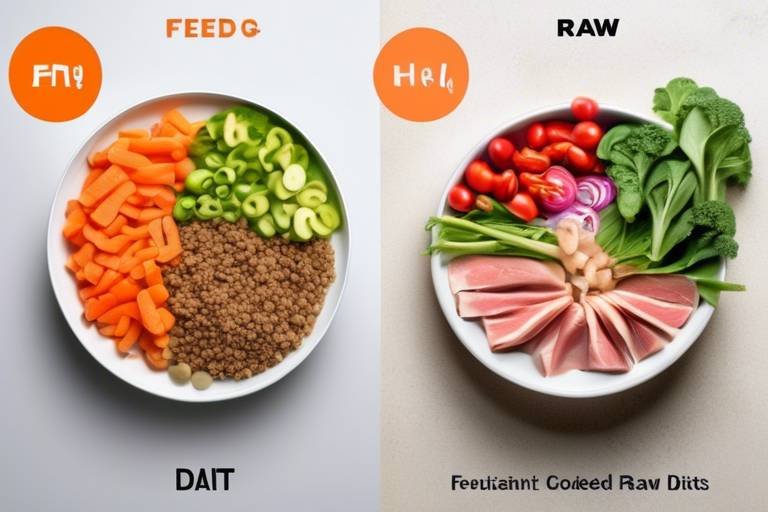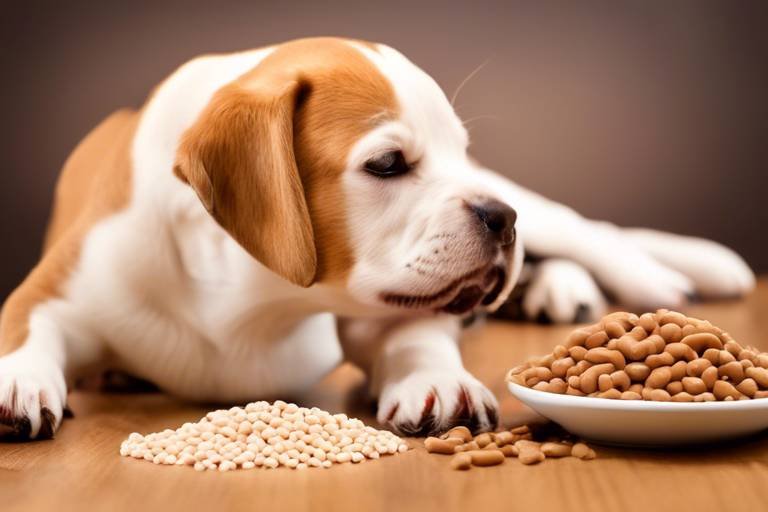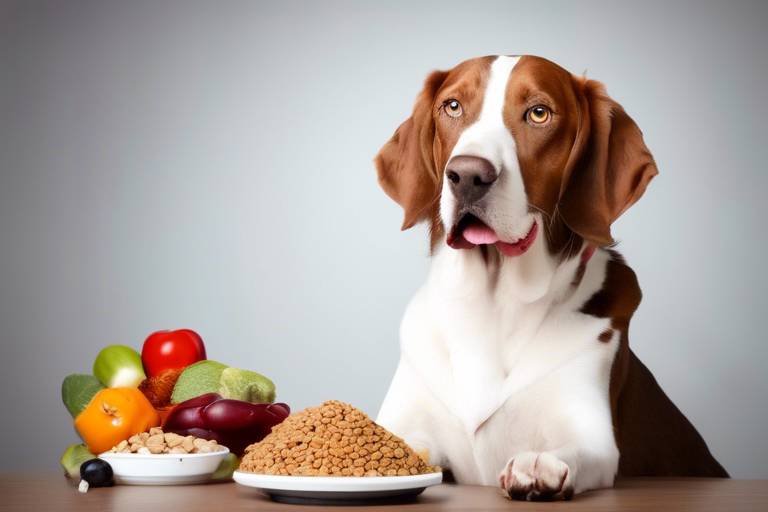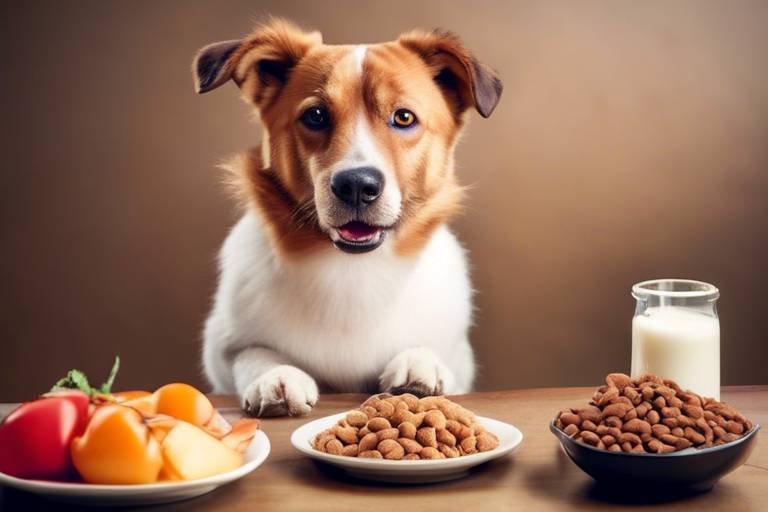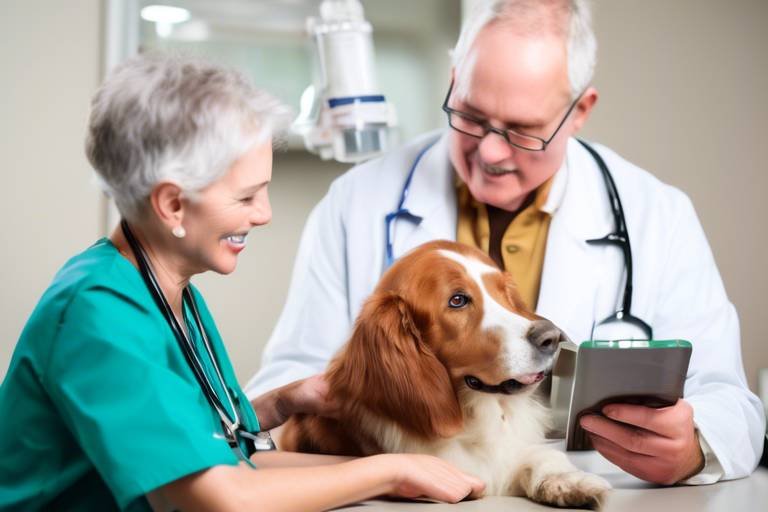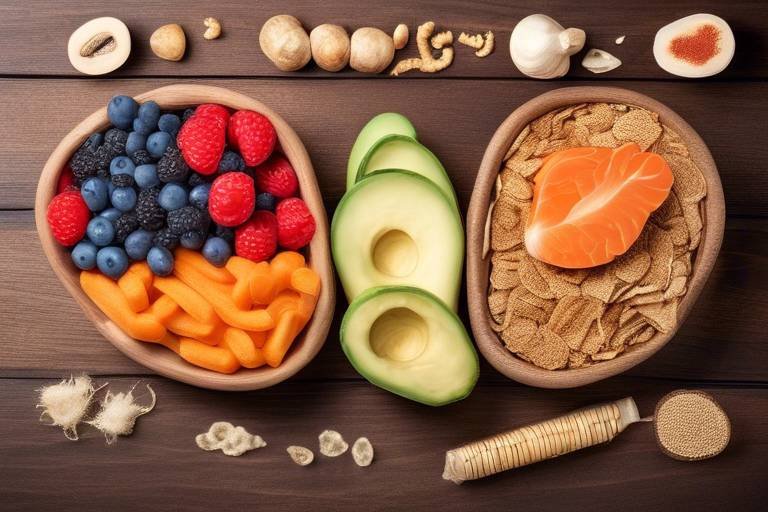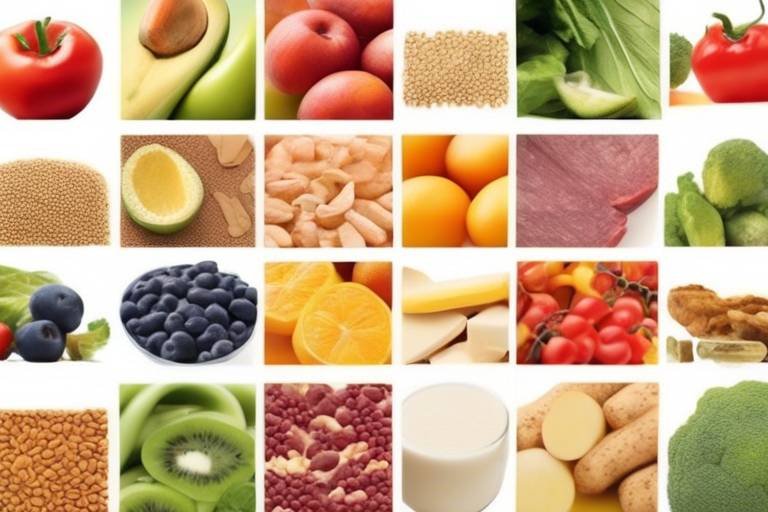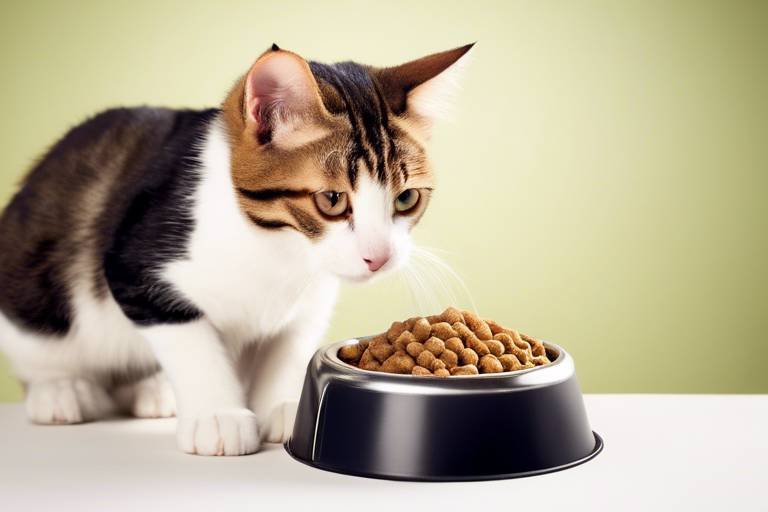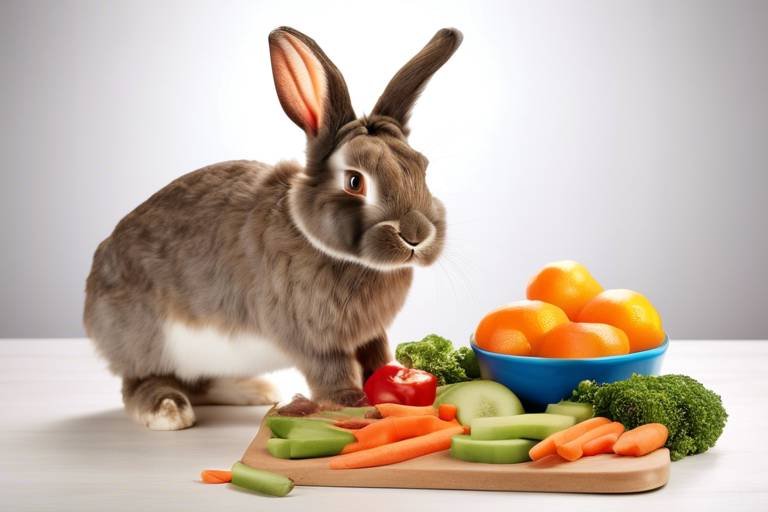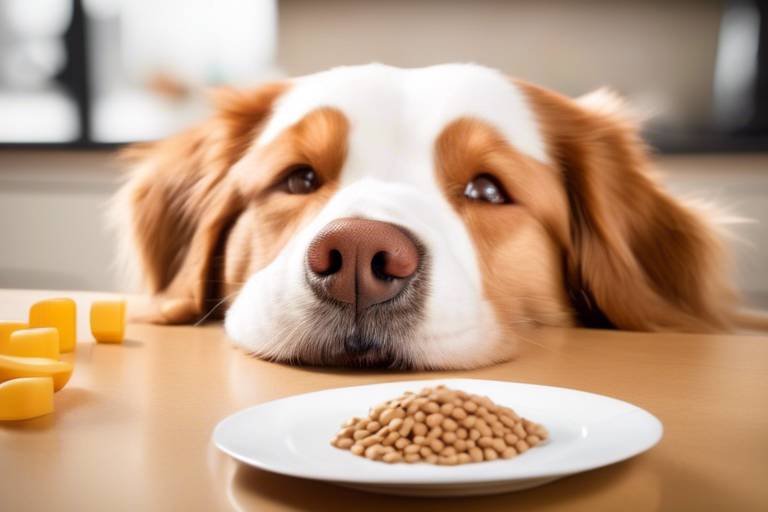The Impact of Diet on Pet Dental Health
When it comes to our furry companions, their dental health is often overlooked, yet it plays a crucial role in their overall wellbeing. Just like humans, pets can suffer from a range of dental issues, including plaque buildup, gum disease, and tooth decay. The good news? The right diet can significantly impact their dental health! By understanding how the food they consume affects their teeth and gums, pet owners can take proactive steps to prevent dental diseases.
Imagine this: your pet’s mouth is like a tiny ecosystem. Every meal they eat contributes to the balance of bacteria, plaque, and overall oral hygiene. A diet rich in the right nutrients can help maintain this balance, while a poor diet can lead to a host of problems. For instance, crunchy dry food can act as a natural toothbrush, scraping away plaque as your pet chews. On the other hand, wet food, while tasty, might leave behind residues that can promote bacterial growth. It’s a delicate dance between nutrition and dental health that every pet owner needs to be aware of.
Moreover, certain nutrients are particularly beneficial for maintaining strong teeth and healthy gums. Calcium and phosphorus are essential for the structural integrity of teeth, while vitamin D plays a vital role in calcium absorption. Without these key ingredients, your pet's dental health could suffer, leading to painful conditions that can affect their quality of life. So, the next time you’re at the pet store or planning a meal for your furry friend, think about the long-term effects that their diet can have on their dental health.
As we dive deeper into the various types of pet diets, it’s important to remember that what works for one pet may not work for another. Each animal has unique dietary needs and preferences, which is why consulting with a veterinarian about the best diet for your pet is always a wise choice. By tailoring their diet to their specific needs, you can help ensure that they enjoy a healthy mouth and a happy life.
- What are the signs of dental problems in pets? Look for symptoms like bad breath, difficulty eating, swollen gums, or excessive drooling.
- Can I give my pet dental treats? Yes, dental treats can be beneficial, but they should not replace regular dental care and a balanced diet.
- How often should I take my pet for dental check-ups? Regular veterinary check-ups are recommended at least once a year, but consult your vet for personalized advice.
- Are homemade diets good for dental health? They can be, but it’s essential to ensure they are balanced and include ingredients that promote dental health.

The Role of Nutrition in Dental Health
Understanding the connection between nutrition and dental health is essential for pet owners who want to keep their furry friends healthy and happy. Just like humans, pets require a balanced diet to maintain their overall well-being, and this includes their oral health. Proper nutrients can strengthen teeth and gums, significantly reducing the risk of dental diseases.
When we think about nutrition, we often consider how it affects our pet's energy levels and weight. However, what many pet owners overlook is that the right diet can also play a crucial role in preventing dental issues such as plaque buildup, gingivitis, and even tooth loss. A diet rich in the right vitamins and minerals can help combat these problems. For instance, calcium and phosphorus are vital for strong teeth and bones. When pets consume foods that are lacking in these essential nutrients, they may be more susceptible to dental issues.
Moreover, the texture of the food can also influence dental health. Dry kibble, for example, can provide a mechanical cleaning effect as pets chew, helping to scrape away plaque and tartar. This is a natural way to maintain oral hygiene, and it’s one of the reasons why many veterinarians recommend dry food as part of a pet's diet. On the other hand, wet food, while often more palatable, can leave residues that promote bacterial growth, leading to potential dental problems if not balanced with other food types.
In addition to the type of food, the timing and frequency of feeding can also impact dental health. Regular feeding schedules can help manage plaque buildup and encourage better chewing habits. It's essential to monitor your pet's eating habits and adjust their diet as needed to promote optimal dental health.
To summarize, nutrition plays a pivotal role in maintaining your pet's dental health. By providing a balanced diet rich in essential nutrients, pet owners can help prevent dental diseases and promote overall well-being. Remember, a healthy mouth is a happy mouth, and investing in your pet's nutrition is a step towards ensuring they lead a long, healthy life.
- What are the best foods for my pet's dental health? Look for high-quality dry kibble that has been specifically formulated to support dental health.
- Can I give my pet treats? Yes, but choose dental chews or treats that are designed to reduce plaque and tartar buildup.
- How often should I take my pet for a dental check-up? It's recommended to have a professional dental check-up at least once a year.
- Are homemade diets good for dental health? Homemade diets can be beneficial if they include crunchy vegetables and appropriate proteins, but be cautious about missing essential nutrients.

When it comes to keeping our furry friends healthy, their diet plays a pivotal role, especially concerning their dental health. It's fascinating how what goes into their bowls can shape the condition of their teeth and gums. Let's dive into the different types of pet diets available and explore how each one can impact dental care. Understanding these options can empower pet owners to make informed choices that promote oral health.
There are primarily three types of diets that pet owners consider: dry food, wet food, and raw diets. Each type has its own set of benefits and drawbacks, particularly when it comes to maintaining dental hygiene. For instance, dry food is often praised for its ability to mechanically clean teeth as pets chew, while wet food can be more appealing but may contribute to plaque buildup. Raw diets present a more natural approach but require careful consideration to ensure safety and nutritional balance.
Let’s break down these diets further:
| Diet Type | Benefits | Potential Drawbacks |
|---|---|---|
| Dry Food |
|
|
| Wet Food |
|
|
| Raw Diet |
|
|
As you can see, each diet type has its unique characteristics that can affect your pet's dental health. For instance, dry food, with its crunchy texture, can help scrape away plaque during chewing, making it a popular choice among pet owners who prioritize dental care. On the other hand, while wet food can be a treat for picky eaters, it may leave behind residues that promote bacterial growth, which could lead to dental issues if not balanced with other food types.
Raw diets can potentially offer natural dental benefits due to the chewing involved, but they also come with risks that require careful management. If you're considering a raw diet for your pet, it's essential to consult with a veterinarian to ensure that it's implemented safely and effectively.
Ultimately, the best diet for your pet's dental health will depend on their individual needs, preferences, and any specific health concerns they may have. By understanding the implications of each diet type, pet owners can make choices that not only satisfy their pets' taste buds but also contribute to their long-term dental health.
Dry Food vs. Wet Food
When it comes to choosing the right diet for your furry friend, the debate between dry food and wet food is a hot topic among pet owners. Each type of food has its advantages and disadvantages, particularly in relation to dental health. Understanding these differences can help you make an informed decision that not only satisfies your pet's taste buds but also promotes their oral hygiene.
Dry food, often referred to as kibble, is known for its crunchy texture. As pets chew on these little nuggets, the mechanical action can help to scrape away plaque and tartar from their teeth. This natural cleaning effect is crucial because it reduces the likelihood of dental diseases such as gingivitis and periodontal disease. The fact that dry food is less moist means it’s less likely to stick to the teeth, which is a significant plus when considering long-term dental health.
On the other hand, wet food can be more appealing to pets due to its rich flavor and aroma. However, the downside is that it tends to leave a residue that can promote bacterial growth in the mouth. This residue can lead to a buildup of plaque, which, if not managed properly, can result in serious dental issues. It's a bit like choosing between a crunchy apple and a soft, juicy peach; while both are delicious, one offers a better chance of keeping your teeth clean!
Here's a quick comparison of the two types of food:
| Aspect | Dry Food | Wet Food |
|---|---|---|
| Texture | Crunchy | Soft |
| Dental Health | Helps reduce plaque | May contribute to plaque buildup |
| Moisture Content | Low | High |
| Palatability | Moderate | High |
So, what should you choose? It often comes down to your pet's individual needs and preferences. Some pet owners opt for a combination of both dry and wet food to balance the benefits. This approach can provide the mechanical cleaning of dry food while also offering the palatability of wet food. Think of it as a balanced diet that caters to both taste and health!
Ultimately, the best choice for your pet will depend on various factors, including their age, health status, and personal preferences. It's always a good idea to consult with your veterinarian to determine the best dietary plan that supports your pet's dental health and overall wellbeing.
- Can I mix dry and wet food? Yes, many pet owners find that a combination can provide the benefits of both types of food.
- How often should I brush my pet's teeth? Ideally, you should brush your pet's teeth daily, but even a few times a week can make a significant difference.
- What are the signs of dental problems in pets? Look for bad breath, difficulty eating, and swollen gums as potential indicators of dental issues.
Benefits of Dry Food
When it comes to choosing the right diet for your furry friend, dry food often stands out as a popular choice among pet owners. One of the key benefits of dry food is its ability to promote dental health through mechanical cleaning. As pets munch on those crunchy kibbles, the act of chewing helps to scrape away plaque and tartar that can accumulate on their teeth. This natural cleaning process can lead to healthier teeth and gums over time, significantly reducing the risk of dental diseases.
Moreover, dry food tends to be lower in moisture content compared to wet food, which can be a double-edged sword. While the lack of moisture means it may not be as palatable for some pets, it also reduces the likelihood of bacterial growth that can occur in leftover wet food. This is particularly important for maintaining overall oral hygiene. In essence, dry food can act as a safeguard against dental issues, allowing pet owners to feel more confident in their choice.
Another advantage of dry pet food is its convenience. It’s generally easier to store and serve, making it a practical option for busy pet owners. You can keep a bag of dry food on hand without worrying about spoilage, which can be a concern with wet food. Additionally, dry food often has a longer shelf life, allowing you to buy in bulk and save money in the long run.
However, it’s important to choose high-quality dry food that is specifically formulated for your pet's needs. Not all dry foods are created equal, and some may contain fillers or artificial ingredients that do not contribute to your pet’s health. Always look for products that list real meat as the first ingredient and avoid those with excessive grains or by-products.
In conclusion, while dry food may not be the only option available, its benefits for dental health, convenience, and cost-effectiveness make it a strong contender for pet owners seeking to improve their pets' overall wellbeing. As with any dietary choice, it’s essential to consult with your veterinarian to find the best food that caters to your pet’s specific health requirements.
- Can dry food alone prevent dental disease?
While dry food can help reduce plaque buildup, it should be part of a comprehensive dental care routine that includes regular veterinary check-ups and professional cleanings. - How do I choose the right dry food?
Look for high-quality brands with real meat as the first ingredient and minimal fillers. Consult your vet for recommendations tailored to your pet's specific needs. - Is it safe to mix dry and wet food?
Yes, many pet owners choose to mix both types of food to provide variety and balance in their pet's diet. Just ensure that the total caloric intake aligns with your pet's dietary needs.
Potential Issues with Wet Food
While wet food can be a delightful treat for our furry friends, it’s essential to be aware of some potential drawbacks that can impact their dental health. One of the primary concerns is that wet food tends to leave a residue on teeth, which can promote the growth of bacteria. This sticky substance can create an ideal environment for plaque buildup, leading to tartar formation and, ultimately, dental disease. Imagine a beautiful cake that, while delicious, leaves a sticky mess on your plate—this is similar to how wet food can leave residue on your pet's teeth.
Moreover, wet food is often higher in moisture content, which means it lacks the abrasive qualities that dry food provides. When pets chew on dry kibble, the mechanical action helps to scrape away plaque and debris from their teeth. In contrast, wet food can be more like a soft, creamy dessert that doesn't require much chewing, resulting in less natural cleaning of the teeth. This can be particularly concerning for pets that primarily consume wet food, as they may not be getting the dental benefits that come from chewing.
Another issue to consider is the potential for dental diseases that can arise from a diet too rich in wet food. These conditions can lead to painful infections and loss of teeth, which can severely affect your pet's quality of life. For example, periodontal disease can develop when bacteria from plaque enter the bloodstream, affecting not just oral health but overall health as well. This is why it's crucial to balance wet food with other types of diets that promote dental hygiene.
In summary, while wet food can be more palatable and enjoyable for pets, it’s important to incorporate it wisely into their diets. Regular dental check-ups and a combination of food types can help mitigate the risks associated with wet food. As a responsible pet owner, keeping a close eye on your pet’s dental health should be a top priority, ensuring that their diet supports not just their taste buds, but their overall well-being.
- Can I mix wet and dry food for my pet?
Yes, mixing wet and dry food can provide a balanced diet, but ensure that you monitor your pet's dental health regularly. - How often should I take my pet for dental check-ups?
It's recommended to have your pet's dental health checked at least once a year, but consult your veterinarian for personalized advice. - Are there specific brands of wet food that are better for dental health?
Look for brands that include dental health benefits or are specifically formulated to reduce plaque and tartar buildup.
Raw Diet Considerations
When it comes to feeding our furry companions, the raw diet has gained significant popularity among pet owners. This diet primarily consists of uncooked meat, bones, fruits, and vegetables, aiming to mimic what dogs and cats would naturally consume in the wild. However, while the benefits of a raw diet can be enticing, there are several important considerations to keep in mind, especially regarding dental health.
One of the primary advantages of a raw diet is its potential to promote dental health. Chewing on raw meaty bones can help mechanically clean teeth, scraping away plaque and tartar as pets gnaw. This natural form of dental care can be particularly beneficial for pets prone to dental issues. However, it’s crucial to ensure that the bones are appropriate for your pet’s size and chewing habits to avoid any choking hazards or dental fractures.
That said, there are also risks associated with raw diets. One significant concern is bacterial contamination. Raw meat can harbor pathogens like Salmonella and E. coli, which can pose health risks not only to pets but also to humans in the household. It's essential to handle raw food safely and maintain strict hygiene practices. Additionally, balancing a raw diet to ensure it meets all nutritional needs can be challenging. Many pet owners may unknowingly create a diet that lacks essential nutrients, leading to deficiencies over time.
For those considering a raw diet, it’s advisable to consult with a veterinarian or a pet nutritionist. They can provide guidance on how to formulate a balanced diet that supports dental health while also ensuring that your pet receives all necessary vitamins and minerals. Here are some key points to consider:
- Bone Selection: Choose raw bones that are appropriate for your pet's size and chewing ability.
- Hygiene Practices: Always wash your hands and any surfaces that come into contact with raw food.
- Consultation: Work with a professional to develop a balanced raw diet.
In summary, while a raw diet can offer certain dental health benefits, it's essential to weigh these against the potential risks. Proper planning, hygiene, and veterinary guidance are key to ensuring that your pet thrives on a raw diet while maintaining optimal dental health.
Q: Is a raw diet safe for all pets?
A: Not all pets may thrive on a raw diet. It's essential to consult with a veterinarian to determine if it's suitable for your specific pet, especially if they have underlying health issues.
Q: How can I ensure my pet's raw diet is balanced?
A: A balanced raw diet should include a variety of meats, bones, organs, and vegetables. Consulting with a pet nutritionist can help you create a well-rounded meal plan.
Q: What are the signs that my pet might be having dental issues?
A: Common signs include bad breath, difficulty eating, swollen gums, and noticeable plaque or tartar buildup.
Q: Can I mix raw food with kibble?
A: Mixing raw food with kibble is generally not recommended as it can lead to digestive issues. It's best to feed them separately.
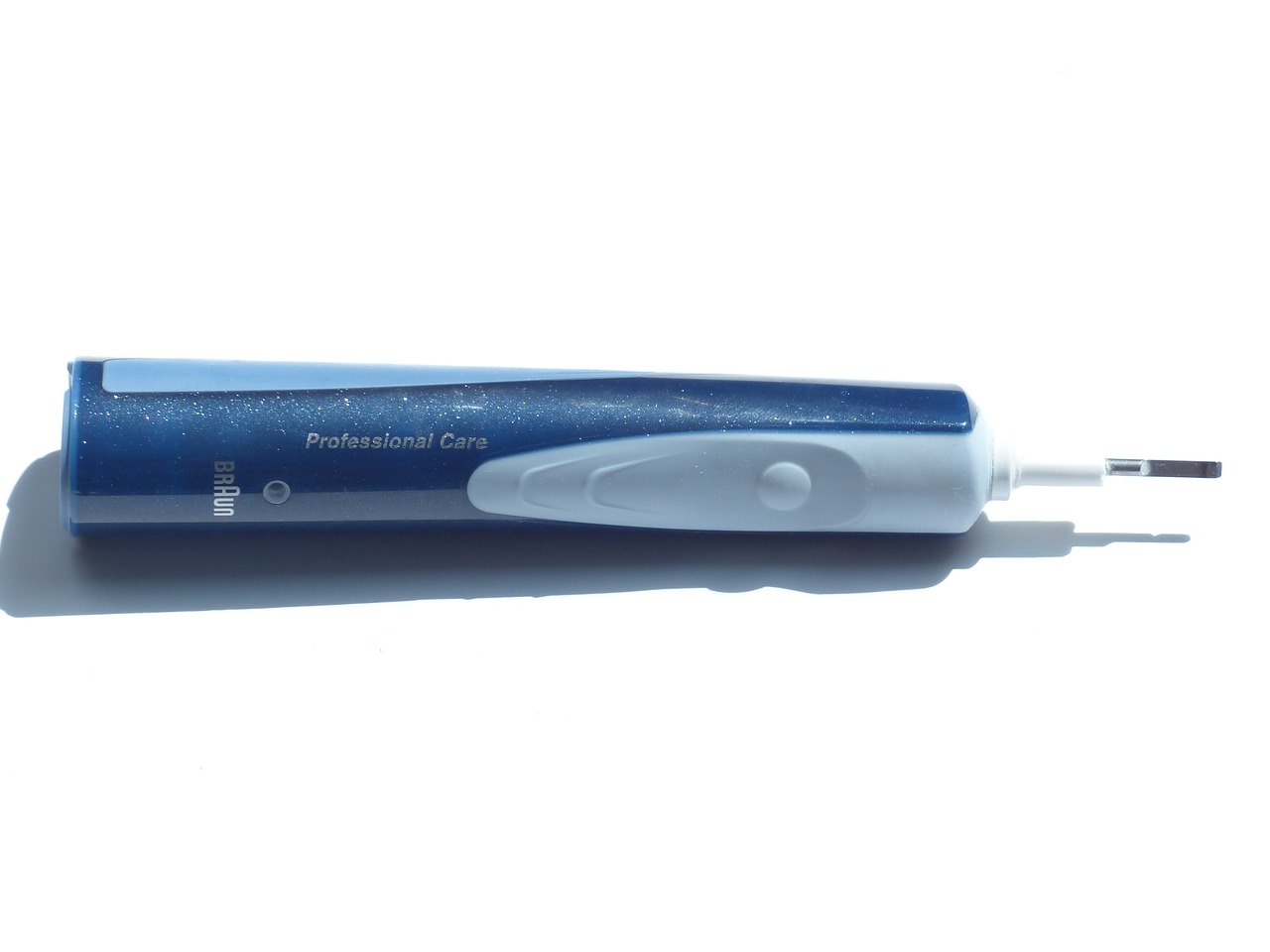
Specific Nutrients for Dental Care
When it comes to keeping our furry friends' teeth and gums in tip-top shape, specific nutrients play a pivotal role. Just like how we need a balanced diet to maintain our health, pets require certain vitamins and minerals to ensure their dental health is not just an afterthought. So, what are these magical nutrients, and how can they help? Let’s dive into the essentials!
First on the list are calcium and phosphorus. These two minerals are fundamental for building and maintaining strong teeth and bones in pets. Think of calcium as the building block of teeth, while phosphorus works hand-in-hand to keep those structures robust. A deficiency in these minerals can lead to weakened teeth, making them more susceptible to decay and disease. To ensure your pet gets enough of these nutrients, consider incorporating foods rich in calcium and phosphorus into their diet, such as:
- Fish
- Eggs
- Meat and poultry
- Cheese
Next up is Vitamin D. This vitamin is crucial for the absorption of calcium, meaning that without it, all that calcium you’re feeding your pet might not be doing much good. Vitamin D helps in the regulation of calcium and phosphorus levels in the body, which is vital for dental health. You can find this nutrient in fatty fish, liver, and fortified pet foods. Just remember, too much Vitamin D can be harmful, so balance is key!
Another important nutrient is Vitamin C. While dogs can synthesize this vitamin themselves, cats cannot, making it essential in their diet. Vitamin C helps support gum health and can reduce inflammation, which is particularly important for pets prone to gum disease. Foods like bell peppers, broccoli, and certain fruits can be great sources of Vitamin C for your pets.
Let’s not forget about Omega-3 fatty acids. These are not just good for your pet’s coat; they also have anti-inflammatory properties that can benefit their gums. Incorporating sources of Omega-3s, like fish oil or flaxseed oil, can help reduce gum inflammation and improve overall oral health.
In conclusion, ensuring your pet receives a balanced diet filled with these specific nutrients is crucial for maintaining their dental health. A well-rounded diet not only promotes strong teeth and gums but also contributes to their overall wellbeing. Always consult your veterinarian before making significant changes to your pet's diet to ensure it's tailored to their specific needs.
Q: How often should I take my pet for dental check-ups?
A: It's generally recommended to have your pet's teeth checked at least once a year, but some pets may require more frequent visits depending on their dental health.
Q: Can I give my pet human food for dental health?
A: While some human foods can be beneficial, it's essential to consult with your veterinarian to ensure that what you're feeding is safe and appropriate for your pet.
Q: Are dental chews effective for maintaining my pet's oral health?
A: Yes, dental chews can help reduce plaque and tartar buildup, but they should not replace regular dental care and professional cleanings.
Q: What are the signs of dental problems in pets?
A: Common signs include bad breath, difficulty eating, swollen gums, and excessive drooling. If you notice any of these symptoms, consult your veterinarian promptly.
Calcium and Phosphorus
When it comes to maintaining your pet's dental health, two nutrients stand out as absolutely essential: calcium and phosphorus. These minerals are like the dynamic duo of dental care, working together to ensure that your furry friend's teeth remain strong and their gums healthy. Think of calcium as the building block for teeth and bones, while phosphorus acts as a supportive partner that helps keep everything in balance. Without sufficient amounts of these nutrients, you could be setting your pet up for dental issues down the line.
Calcium is crucial for the formation of teeth and bones. It helps in the development of the dental structure, ensuring that your pet's teeth are not only strong but also properly aligned. On the other hand, phosphorus plays a significant role in the mineralization of teeth, which is the process that helps harden and strengthen the enamel. The relationship between these two minerals is symbiotic; they rely on each other to perform effectively. For instance, without enough phosphorus, calcium cannot be effectively absorbed, leading to potential deficiencies that could compromise your pet's dental health.
But how do you ensure that your pet is getting enough calcium and phosphorus in their diet? The key is to focus on a balanced diet that includes high-quality sources of these nutrients. Here’s a quick rundown of some excellent food sources:
| Food Source | Calcium Content (mg per 100g) | Phosphorus Content (mg per 100g) |
|---|---|---|
| Chicken (with bones) | 150 | 180 |
| Fish (like salmon) | 30 | 250 |
| Green leafy vegetables (like kale) | 150 | 30 |
| Eggs | 50 | 70 |
Incorporating these foods into your pet's meals can help ensure they receive adequate levels of calcium and phosphorus. However, it's essential to strike a balance; too much of these minerals can lead to health issues as well. Always consult with your veterinarian to determine the right amounts for your specific pet, especially if you’re considering a homemade diet.
In summary, calcium and phosphorus are not just nutrients; they are vital components of your pet's overall dental health. By understanding their importance and ensuring your furry friend gets enough of both, you can help pave the way for a long, healthy life filled with bright smiles and wagging tails.
Vitamin D and Its Benefits
When it comes to maintaining your pet's dental health, Vitamin D plays a surprisingly pivotal role. This essential vitamin is not just a buzzword; it's a powerhouse that helps in the absorption of calcium, which is crucial for strong teeth and bones. Imagine trying to build a sturdy house without a solid foundation—this is akin to your pet’s dental health without sufficient Vitamin D. Without it, all the calcium-rich foods in the world won’t do your furry friend much good!
Vitamin D can be obtained through a few different sources. The most natural way is through sunlight exposure, as pets can synthesize Vitamin D when their skin is exposed to UV rays. However, for indoor pets or those who don’t get much sun, dietary sources become essential. Foods like fatty fish, liver, and egg yolks are excellent sources of Vitamin D. But here's the tricky part: not all pet foods are created equal. Many commercial pet foods might not contain enough Vitamin D, leading to deficiencies that can impact not only dental health but overall wellbeing.
Moreover, it's important to note that while Vitamin D is crucial, balance is key. Too much Vitamin D can lead to toxicity, which can cause serious health issues, including kidney problems. Therefore, if you're considering supplements, it's best to consult with your veterinarian to ensure you're giving your pet the right amount. A well-rounded diet that includes the right levels of Vitamin D can lead to healthier gums and teeth, reducing the risk of dental diseases that can affect your pet’s quality of life.
In summary, ensuring your pet gets adequate Vitamin D is a vital piece of the puzzle in maintaining their dental health. A diet rich in this vitamin, along with regular veterinary check-ups, can help keep your pet’s teeth and gums in excellent condition. So, next time you’re shopping for pet food or considering a homemade diet, remember to check for Vitamin D content—it could make all the difference!
- How can I ensure my pet gets enough Vitamin D? - You can ensure your pet gets enough Vitamin D by providing a balanced diet that includes natural sources like fish and eggs, and by allowing them some sunlight exposure.
- What are the signs of Vitamin D deficiency in pets? - Signs may include weak bones, dental issues, and overall lethargy. If you notice any of these symptoms, consult your veterinarian.
- Can I give my pet Vitamin D supplements? - While supplements can be beneficial, it's crucial to consult with your veterinarian first to avoid the risk of toxicity.
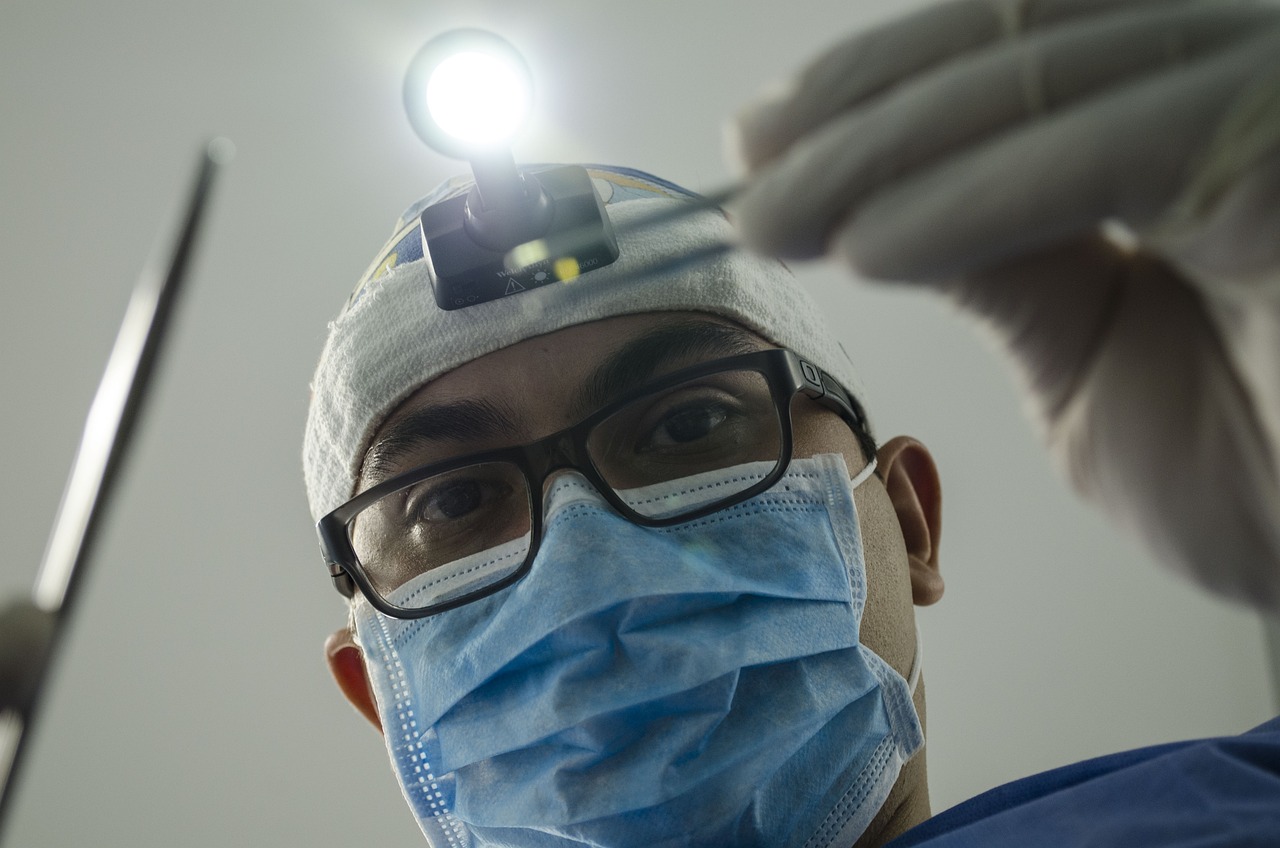
Homemade Diets and Dental Health
As pet owners, we often want the best for our furry companions, and that includes their diet. One popular choice that many consider is a homemade diet. While preparing meals from scratch can provide better control over what your pet consumes, it’s vital to ensure that these meals are nutritionally balanced to support not only their overall health but also their dental health.
When crafting homemade meals, incorporating certain ingredients can significantly enhance your pet's dental health. For instance, crunchy vegetables like carrots and celery can act as natural toothbrushes, helping to scrape away plaque as your pet chews. Additionally, including specific proteins, such as chicken or fish, can provide essential nutrients that contribute to strong teeth and healthy gums.
However, it’s crucial to be aware of common mistakes that pet owners make when preparing homemade diets. Many people overlook the importance of including all necessary vitamins and minerals, which can lead to deficiencies. For instance, a lack of calcium and phosphorus can weaken your pet's teeth, making them more susceptible to decay. Therefore, it’s essential to consult with a veterinarian or a pet nutritionist to create a well-rounded meal plan that caters to your pet’s specific needs.
Moreover, while homemade diets can be beneficial, they require a commitment to research and preparation. It’s not just about throwing together some ingredients; it’s about understanding the nutritional value of each component. For example, certain fruits and vegetables can be harmful to pets, so it’s important to do your homework. A balanced homemade diet can lead to a happier, healthier pet, but it requires diligence and knowledge.
In conclusion, homemade diets can be an excellent way to promote dental health in pets, provided they are carefully planned and executed. By focusing on the right ingredients and avoiding common pitfalls, you can create meals that not only satisfy your pet's taste buds but also support their dental hygiene. Remember, the road to a healthy pet is paved with good nutrition, so take the time to get it right!
- Can homemade diets really improve my pet's dental health? Yes, when balanced correctly, homemade diets can include ingredients that promote dental hygiene, such as crunchy vegetables.
- What are some common mistakes to avoid with homemade diets? Overlooking essential nutrients and including harmful ingredients are two major pitfalls to watch out for.
- Should I consult a vet before switching to a homemade diet? Absolutely! Consulting a veterinarian ensures that your pet's dietary needs are met.
Ingredients to Include
When it comes to crafting a homemade diet for your furry friend, choosing the right ingredients is crucial for promoting dental health. You want to ensure that the meals you prepare not only satisfy their taste buds but also contribute to their overall wellbeing. Think of it like building a solid foundation for a house; without the right materials, the structure won't stand strong. Here are some key ingredients to consider including in your pet's diet:
Crunchy Vegetables: Incorporating crunchy vegetables like carrots, celery, and green beans can be a game-changer for your pet's dental health. As they chew on these fibrous foods, they help to mechanically scrub away plaque and tartar from their teeth, similar to how a toothbrush works. Plus, these veggies are low in calories and high in nutrients, making them a fantastic addition to any meal.
Specific Proteins: Lean proteins such as chicken, turkey, and fish are excellent choices for homemade pet diets. Not only do they provide essential amino acids, but they also contribute to strong teeth and gums. Fish, in particular, is rich in omega-3 fatty acids, which can help reduce inflammation in the gums, promoting overall oral health.
Whole Grains: While some pet owners might shy away from grains, whole grains like brown rice and oats can be beneficial when included in moderation. They provide energy and fiber, and when cooked properly, they can be gentle on your pet's digestive system. Just ensure that grains do not make up the bulk of their diet, as pets thrive primarily on protein.
Natural Dental Chews: Consider adding natural dental chews made from ingredients like sweet potatoes or pumpkin. These chews not only satisfy your pet's chewing instinct but also help to clean their teeth as they gnaw away at the texture. It's like giving them a tasty toothbrush!
By combining these ingredients thoughtfully, you can create balanced meals that not only taste great but also support your pet's dental health. Remember, while homemade diets can be incredibly nutritious, it’s important to consult with a veterinarian or a pet nutritionist to ensure that you’re meeting all of your pet's dietary needs.
Q: Can I feed my pet only homemade food?
A: While homemade food can be healthy, it's crucial to ensure that it meets all of your pet's nutritional needs. Consulting a veterinarian is recommended to create a balanced diet.
Q: Are there any ingredients I should avoid?
A: Yes, certain foods like chocolate, onions, garlic, and grapes can be toxic to pets. Always research ingredients or consult with a vet before adding new items to your pet's diet.
Q: How often should I include crunchy vegetables in my pet's diet?
A: Crunchy vegetables can be included in your pet's meals several times a week, but it's important to monitor how they react to new foods and adjust accordingly.
Q: Can dental chews replace regular dental care?
A: Dental chews can help reduce plaque and tartar, but they should not replace regular veterinary dental check-ups and cleanings.
Common Mistakes to Avoid
When it comes to preparing homemade diets for your pets, it’s easy to get caught up in the excitement of crafting the perfect meal. However, many pet owners unknowingly make common mistakes that can jeopardize their furry friends' dental health. One of the biggest pitfalls is not including a variety of food types in their diet. Pets thrive on diversity, and relying solely on one type of ingredient can lead to nutritional deficiencies. For example, if you only feed your dog chicken, they may miss out on essential nutrients found in fish or beef.
Another frequent error is overlooking the importance of texture. Crunchy foods can help scrape away plaque, while soft foods may not provide the same dental benefits. If you’re preparing a homemade diet, consider incorporating crunchy vegetables like carrots or apples. These not only provide essential vitamins but also act as natural toothbrushes. However, be cautious about the size and preparation of these foods; they should be appropriately sized to prevent choking hazards.
Moreover, many pet owners forget to consult with a veterinarian or a pet nutritionist before making significant dietary changes. This step is crucial, as professionals can guide you in creating a balanced meal plan that meets your pet's specific needs. For instance, some ingredients that are safe for dogs may not be suitable for cats, and vice versa. Ignoring this advice can lead to serious health issues down the line.
Finally, it's essential to avoid sudden diet changes. Just like humans, pets can experience digestive upset if their diet is altered too quickly. Gradually introducing new ingredients over a week or two can help your pet adjust without discomfort. Remember, a well-balanced diet is not just about what you feed your pet; it's also about how you transition them into new foods.
- What are the signs that my pet might have dental issues?
Common signs include bad breath, difficulty eating, and swollen gums. If you notice any of these symptoms, consult your veterinarian. - Can I use human food in my pet's diet?
Yes, but ensure it’s safe for them. Foods like cooked chicken, carrots, and sweet potatoes can be beneficial, while others like chocolate and onions are toxic. - How often should I take my pet for dental check-ups?
Regular check-ups are recommended at least once a year, but your vet may suggest more frequent visits based on your pet’s dental health. - Is it necessary to brush my pet's teeth?
Yes, regular brushing is highly beneficial. It helps prevent plaque buildup and maintains your pet's overall dental health.

Regular Veterinary Check-ups
When it comes to maintaining your pet's dental health, are absolutely essential. Just like we humans need our dentist visits to keep our pearly whites in check, our furry friends require the same level of care to ensure their teeth and gums remain healthy. These check-ups are not just about a quick glance at their teeth; they are comprehensive evaluations that can help prevent serious dental diseases before they escalate. Imagine your pet's mouth as a bustling city; without regular maintenance, problems can arise, leading to chaos and discomfort.
During a routine visit, your veterinarian will perform a thorough examination of your pet's mouth, looking for signs of plaque buildup, gum disease, and other potential issues. They may also recommend professional dental cleanings, which are crucial for removing tartar that regular brushing at home might miss. Think of it as a deep clean for your pet's teeth, similar to how you might clean your house before hosting a party. A clean mouth not only promotes better breath but also contributes to your pet's overall health.
It's important to recognize the signs of dental problems early on. Some common symptoms to watch for include:
- Bad breath that seems persistent
- Red or swollen gums
- Difficulty eating or chewing
- Excessive drooling
- Loose or missing teeth
If you notice any of these signs, don’t hesitate to schedule an appointment with your vet. Early intervention can make a world of difference, preventing minor issues from turning into major health concerns. Just like a stitch in time saves nine, addressing dental problems early can save your pet from pain and expensive treatments later on.
Moreover, professional cleanings offer numerous benefits that contribute to your pet's wellbeing:
| Benefit | Description |
|---|---|
| Prevention of Dental Diseases | Regular cleanings help prevent plaque and tartar buildup, reducing the risk of gum disease and tooth loss. |
| Improved Breath | Professional cleanings can eliminate bad breath caused by bacteria and food particles stuck in the teeth. |
| Early Detection | Vets can spot potential issues before they become serious, allowing for timely treatment. |
| Overall Health | Good dental health is linked to overall health; keeping teeth clean can reduce the risk of other health issues. |
In conclusion, are a fundamental part of your pet's dental care routine. They not only help maintain your pet's oral hygiene but also contribute significantly to their overall health and happiness. So, make it a point to schedule those vet visits and keep your furry companion's smile bright and healthy!
- How often should I take my pet for dental check-ups? It's recommended to have a veterinary dental check-up at least once a year, but some pets may need more frequent visits based on their individual health needs.
- Can I brush my pet's teeth at home? Yes! Regular brushing at home can significantly improve your pet's dental health. Use a toothbrush and toothpaste specifically designed for pets.
- What are some signs that my pet needs dental care? Look for bad breath, swollen gums, difficulty eating, or excessive drooling as indicators that your pet may need dental attention.
Signs of Dental Problems
As a pet owner, it’s crucial to be vigilant about your furry friend’s dental health. Just like humans, pets can suffer from a variety of dental issues, and recognizing the signs early can make all the difference. Have you ever noticed your pet avoiding their favorite chew toy or turning their nose up at dinner? These could be subtle indicators that something is amiss in their mouth. Here are some key signs that may suggest your pet is experiencing dental problems:
- Bad Breath: While a little pet breath can be expected, a strong, foul odor is often a red flag indicating plaque buildup or gum disease.
- Gum Inflammation: Healthy gums should be pink and firm. If you notice redness, swelling, or bleeding, it’s time to take action.
- Difficulty Eating: If your pet seems to struggle with chewing or avoids hard food altogether, they may be in pain.
- Excessive Drooling: While some drooling is normal, an increase in drooling, especially if it’s accompanied by foamy saliva, can be a sign of dental distress.
- Loose or Missing Teeth: Teeth should be firmly in place. If you notice any wobbliness or gaps, it’s a cause for concern.
- Pawing at the Mouth: Pets often paw at their faces when they’re uncomfortable. If you see this behavior, it might indicate dental pain.
Recognizing these signs early on can help you take proactive steps to address potential dental issues. Regular inspections of your pet's mouth can help you catch problems before they escalate. You might be surprised at how much you can learn just by gently lifting their lips to check their gums and teeth. If you notice any of the above symptoms, don't hesitate to consult your veterinarian. They can provide a thorough examination and recommend the best course of action to ensure your pet’s dental health is on point.
In addition to keeping an eye on these signs, it's also vital to schedule regular veterinary check-ups. These visits can include professional cleanings that help prevent dental diseases, keeping your pet's mouth healthy and happy. Remember, a healthy mouth contributes to a healthy pet overall!
Q: How often should I brush my pet's teeth?
A: Ideally, you should brush your pet's teeth daily. However, if that’s not feasible, aim for at least a few times a week to help reduce plaque buildup.
Q: Can dental problems affect my pet's overall health?
A: Absolutely! Dental issues can lead to serious health problems, including heart disease and infections, as bacteria from the mouth can enter the bloodstream.
Q: Are there specific foods that can help with my pet's dental health?
A: Yes! Foods that are crunchy can help reduce plaque and tartar buildup. Additionally, some pet foods are specifically formulated to promote dental health.
Q: What should I do if I notice signs of dental problems?
A: If you notice any concerning signs, schedule an appointment with your veterinarian as soon as possible for a thorough evaluation and treatment plan.
Professional Cleaning Benefits
When it comes to maintaining your pet's dental health, professional cleaning is a game changer. Just like we humans visit the dentist for a thorough check-up and cleaning, our furry friends need similar care to keep their teeth in tip-top shape. Regular professional cleanings not only help to remove plaque and tartar that brushing at home might miss, but they also allow for a comprehensive evaluation of your pet's oral health. Imagine this: a dentist not only cleans your teeth but also checks for cavities, gum disease, and any other potential issues. The same goes for your pets!
One of the major benefits of professional cleaning is the ability to identify dental problems before they escalate. For instance, veterinarians can spot early signs of periodontal disease, which, if left untreated, can lead to serious health issues, including infections that can affect the heart, liver, and kidneys. By addressing these problems early, you can save your pet from unnecessary pain and costly treatments down the road.
Furthermore, professional cleanings can significantly improve your pet's breath. Bad breath, or halitosis, is often a sign of dental disease. After a cleaning, pet owners frequently notice a dramatic improvement in their pet's breath, making snuggles much more pleasant! It's not just about aesthetics; fresh breath is a sign of a healthier mouth.
Another notable advantage is the reduction of dental-related discomfort. Pets can be masters at hiding their pain, and dental issues can lead to significant discomfort. By ensuring your pet receives regular cleanings, you can help alleviate any hidden pain and ensure they are living their best life. Think of it as giving your pet a chance to enjoy their favorite chew toys without the hindrance of dental pain.
In addition to the immediate benefits, regular professional cleanings contribute to your pet's overall wellbeing. Healthy teeth and gums can lead to better nutrition, as pets can eat comfortably and enjoy their meals. A well-balanced diet is crucial for their health, and when dental issues are at bay, your pet can thrive!
To summarize, here are some of the key benefits of professional cleaning:
- Thorough removal of plaque and tartar
- Early detection of dental problems
- Improved breath and overall oral hygiene
- Reduced discomfort and pain
- Enhanced overall wellbeing and nutrition
In conclusion, investing in professional dental cleanings is not just a luxury; it’s a necessity for your pet's health. Just like we prioritize our dental health, we must do the same for our beloved companions. So, schedule that appointment and give your pet the gift of a healthy mouth!
Q: How often should my pet have a professional dental cleaning?
A: Generally, it’s recommended to have your pet's teeth professionally cleaned at least once a year. However, some pets may require more frequent cleanings based on their dental health.
Q: Can I brush my pet’s teeth at home instead of getting professional cleanings?
A: While brushing at home is important and can help maintain dental health, it should not replace professional cleanings. Regular vet check-ups and cleanings are essential for comprehensive dental care.
Q: What signs should I look for that indicate my pet needs a dental cleaning?
A: Common signs include bad breath, difficulty eating, red or swollen gums, and excessive drooling. If you notice any of these symptoms, it’s best to consult your veterinarian.
Frequently Asked Questions
- How does my pet's diet affect their dental health?
A pet's diet plays a crucial role in their dental health. The right nutrition can strengthen teeth and gums, helping to prevent dental diseases. For instance, dry food can provide mechanical cleaning, reducing plaque buildup, while wet food may leave residues that can contribute to dental issues.
- Is dry food better for my pet's teeth than wet food?
Yes, dry food is often considered better for dental health because it can help scrape away plaque as pets chew. Wet food, while tasty, can leave a sticky residue that may promote bacterial growth, potentially leading to dental problems if not balanced with other food types.
- What specific nutrients should I look for in my pet's diet?
Key nutrients for dental health include calcium, phosphorus, and vitamin D. Calcium and phosphorus are essential for strong teeth and bones, while vitamin D aids in calcium absorption. Ensure your pet's diet includes these nutrients for optimal dental health.
- Can homemade diets improve my pet's dental health?
Absolutely! Homemade diets can give you control over your pet's nutrition and can be tailored to include crunchy vegetables and specific proteins that promote dental health. However, it's vital to ensure these diets are balanced and include all necessary nutrients.
- What are the signs of dental problems in pets?
Common signs of dental issues in pets include bad breath, difficulty eating, swollen gums, and visible tartar buildup. If you notice any of these symptoms, it's important to consult your veterinarian for a thorough examination.
- How often should my pet have professional dental cleanings?
Routine veterinary check-ups, including professional dental cleanings, are essential for maintaining your pet's oral health. It's generally recommended to have these cleanings at least once a year, but your vet may suggest more frequent visits based on your pet's specific needs.

